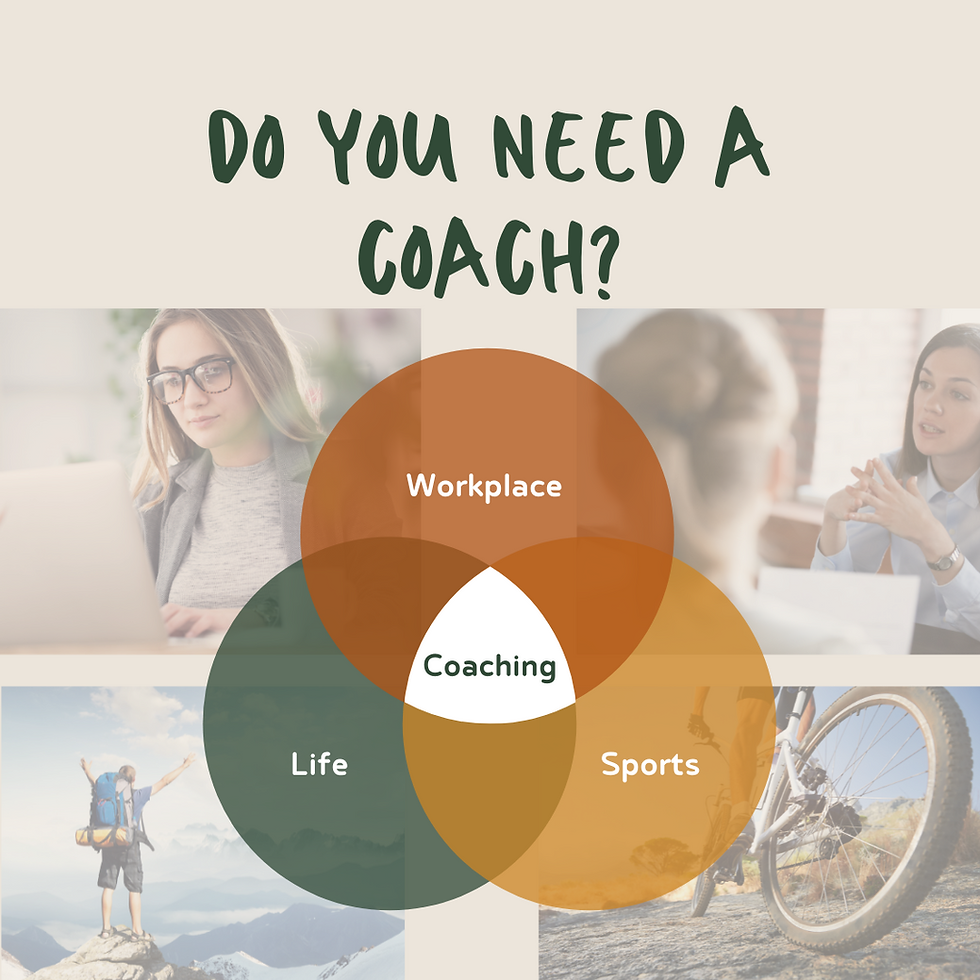Do YOU need a coach?
- Derek Tate
- Jun 18, 2021
- 6 min read
Updated: Jun 25, 2023
'Coaching' is a very hot topic in our modern world and perhaps even more so in the light of COVID and the increasing popularity of the online medium. But do you need a coach? And indeed, what is coaching and what is the role of the coach? In this article I will strive to answer these questions but, before doing so, it is important to clarify that 'coaching' can apply to virtually any domain, or area of life, with some of the most commonly discussed and publicised being the workplace (including business and leadership), life (including mental health and overall well-being) and sport (including recreational, professional, individual and team participation). My own expertise derives from the latter and in particular the sport of alpine skiing. However, more latterly my direction has moved more towards mental health, well-being and positive psychology.
The coaching profession
Before dealing with the role of the coach and whether YOU need a coach it is worth exploring the coaching landscape across the three broad domains as already mentioned and depicted in the picture below.
Coaching as a profession varies considerably in terms of regulation, or rather lack of regulation! While there are many training courses and certifications available essentially anyone can set themselves up as, and call themselves, either a life coach or business coach and this can create real problems when looking for professional services that are backed up by suitable experience and qualifications. My advice would be to really look at the training that someone has had, who they have trained with (and their experience and background) and who recognises the qualifications. *See the end of this article for some of my recommendations.
Sport, on the other hand, has more structure and regulation with national governing bodies of sport delivering coach education pathways with different levels of certification available. The problem, however, is that there is often confusion, and even dispute, in different sports, as to what a coach is and whether that is different to an instructor or teacher? Over the years this has been very much my experience in snowsports with ski and snowboard instructor pathways often offering qualifications using all three of these labels depending on the level and/or the intended use. To make matters even more confusing some commercial organisations offering snowsports programmes often use the term 'coach' in preference to instructor or teacher as they see a coach as being somehow superior and promote this in their advertising!
The role of the coach

Understanding the role of the coach is very much intertwined with unpacking coaching. I can remember vividly one of my first modules on the PG Diploma Sports Coaching at Moray House in Edinburgh, way back in 1992, where we discussed endlessly the role of the coach. And one of the clear takeaways from that module is that the term coach (certainly in sport) is often an overarching term (or umbrella role) that can encompass being a teacher, instructor, facilitator, mentor, motivator etc. But this in no way suggests that any of the aforementioned are lesser roles or require less knowledge and skills.
Perhaps the best way to address the role of the coach is NOT by looking at what the coach should do but rather what the individual (coachee) NEEDS. The great coach is one that will recognise their own strengths and weaknesses, skillset etc. and bring in, or direct, the coachee to other people as required be they teachers, mentors, facilitators, specialists in certain areas etc. While a coach can undertake many different roles, they are unlikely to be an expert across all areas. And of course, life, business and sport will all require different skillsets, knowledge, background etc. recognising that some of the coaching skills and attributes are transferable across domains.
Do YOU need a coach?
So, having briefly discussed the coaching profession and the role of the coach the big question is do you need a coach? Bill Gates famously said in his 2013 TED Talk, "Everyone needs a coach. It doesn't matter whether you're a basketball player, a tennis player, a gymnast or a bridge player" (with the latter referring to himself), "we all need people who give us feedback. That's how we improve". And while I largely agree with this sentiment it is vital that we learn how to use our own feedback sources as well as getting feedback from others be that a coach, peer, colleague, friend etc. Of course a good coach can help you to develop your own feedback channels (visual, auditory and kinaesthetic) through developing your present moment awareness and attention skills. It is this combination of feedback from a coach (or another person) and from yourself that really helps you to improve.
Bill Gates's quote also infers that the primary role of the coach/coaching is to help the coachee improve their performance. And in the workplace, or sport, this is probably true in many cases, although in the workplace this may be driven more by the employer than the employee. While in sport, especially competitive sport, getting better is vital if you are going to win! But intrinsically driven behaviour and goals are always preferable to external pressure so if you can find some balance in all three areas - workplace, sport and life - you are more likely to be intrinsically motivated. Your 'needs' will also vary within these three areas and through different stages of your life. These coaching needs may be more transactional or transformational in nature (or a mixture of the two) and this in itself may determine what kind of coach (or coaches) you require to help you.
Transactional coaching means that there is some form of transaction between coach and coachee with the reaching of tangible goals as the primary focus. Such goals would be more extrinsic, and very measurable, such as improving a particular skill, losing a certain amount of weight, passing a qualification etc. This more traditional form of coaching could be seen as very much equating to the idea of 'improving performance'.
While transformational coaching is about going deeper into the coachee’s experiences and endeavours to work from the inside out. It is about helping the coachee find their true authentic self and in doing so growing and moving towards self-actualisation. In this type of coaching, enjoying the journey, and the experience is more important than the destination with learning about yourself and personal growth being the goal.
So, in answer to the question about needing a coach, I believe that there are times in your life where you do indeed need a coach - a coach that fits with your needs be they transactional and/or transformational - but you also need periods where you trust yourself to be your own coach. Even the great tennis player Roger Federer has spent periods of his career without a coach preferring to rely on his own knowledge and experience to determine his own needs and to develop. Surely that is the true aim of any coaching or teaching process; to help the individual (coachee) trust themselves to be their own guide and coach.
Coaching method & model
Whether you have a coach, or are your own coach, having a coaching method and model to guide you is very helpful. A coaching method is essentially a way of accomplishing change, development and growth and can be used by the coach to help others (coachee), or by the individual to self-coach. A coaching model provides a framework and approach for enacting the method.
Learn, Enjoy, Flow & Grow (LEFG) is a coaching method and is set out, in great detail, in my November, 2020 book of the same name. The book has just been released as an audiobook which, in itself, is a great way to assist the coaching process by listening to the excellent narration of Lianne Walker.
The Transformational Flow Coaching model builds on the LEFG method by presenting a model that is flexible enough to encompass both transactional and transformational coaching. The model is fully explained in the short ebook titled Transformational Flow Coaching: An innovative approach to development and growth.
However you decide to improve, develop and grow, in the different domains of life, is ultimately your choice but I agree with Bill Gates when he says everyone needs a coach whether that is a formally engaged professional coach, informal assistance from a friend, colleague, parent, etc. or yourself. Life is not a solo endeavour; you need others to help you along the way, but you also need to believe and trust yourself because you are the only you!
*Coaching Courses/Training Recommendations
1) Accredited Certificate in Integrative Coaching from the School of Positive Transformation.
2) Foundational Flow Coaching courses from the Parallel Dreams Coaching Academy online school.
3) Certified Coach Training from Coaches Rising.
We are proud to say that the Parallel Dreams Coaching Academy blog is listed on Feedspot in the Top 60 UK Coaching Blogs and Websites to follow in 2021. Visit our listing by clicking here.
About the Author
Derek Tate is an author, coach and teacher and runs Derek Tate Coaching. His mission is to help others to flourish and get more out of life through better mental, emotional, and physical health. He offers mental skills coaching, alpine ski coaching, online courses and workshops and writes self help/psychology books.






Comments